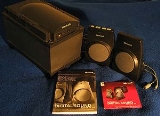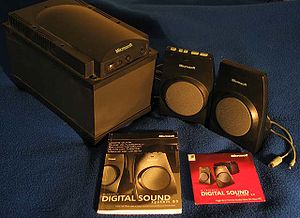
Digital Sound System 80
Encyclopedia
The Digital Sound System 80, short DSS80, was a three-piece PC audio system co-developed by Microsoft
and Philips
. It debuted on the 1998 Electronic Entertainment Expo (E³) and is most likely the only speaker system ever released by the Microsoft Corporation. It also remains one of the very few featuring Philips' wOOx subwoofer
technology.
 The DSS80 featured technological innovations in comparison with contemporary systems. For instance, it didn't require a sound card installed but actually featured its own integrated sound hardware which could be connected via USB and allowed digital quality playback, synchronized hardware and software volume controls, the use of a 10-band graphic equalizer and Microsoft Surround Sound.
The DSS80 featured technological innovations in comparison with contemporary systems. For instance, it didn't require a sound card installed but actually featured its own integrated sound hardware which could be connected via USB and allowed digital quality playback, synchronized hardware and software volume controls, the use of a 10-band graphic equalizer and Microsoft Surround Sound.
To support computers without USB, and to enable users to take advantage of present high-end sound hardware, it additionally featured 3.5mm analog line-in.
It was possible to connect the system both ways to ensure highest compatibility with both analog and digital audio content.
 The plug on the Microsoft DSS80 control satellite speaker ( right speaker ) is a Mini-DIN 4
The plug on the Microsoft DSS80 control satellite speaker ( right speaker ) is a Mini-DIN 4
plug. To say the connector is ADB (Apple desktop Bus) is incorrect, any ADB device plugged into this port would not operate and likewise if the DSS80 were plugged into a Mac ADB port it would not function. Therefore the only similarity is the Mini-DIN 4 connector type.
The pins on the DSS80 plug are connected to the following wires: with the index mark (labeled "B") at 12 o'clock, the pin at 2 o'clock connects to the black wire (speaker ground); the pin at 4 o'clock connects to the red wire (speaker hot); the pin at 8 o'clock connects to the yellow wire; the pin at 10 o'clock connects to the blue wire; and the ground sheath connects to the white wire. If you bypass the plug and wire the cable directly to the subwoofer, remember to mirror these connections.
The subwoofer and satellite speaker are both held together with Torx #10 screws.
Microsoft
Microsoft Corporation is an American public multinational corporation headquartered in Redmond, Washington, USA that develops, manufactures, licenses, and supports a wide range of products and services predominantly related to computing through its various product divisions...
and Philips
Philips
Koninklijke Philips Electronics N.V. , more commonly known as Philips, is a multinational Dutch electronics company....
. It debuted on the 1998 Electronic Entertainment Expo (E³) and is most likely the only speaker system ever released by the Microsoft Corporation. It also remains one of the very few featuring Philips' wOOx subwoofer
Subwoofer
A subwoofer is a woofer, or a complete loudspeaker, which is dedicated to the reproduction of low-pitched audio frequencies known as the "bass". The typical frequency range for a subwoofer is about 20–200 Hz for consumer products, below 100 Hz for professional live sound, and below...
technology.

To support computers without USB, and to enable users to take advantage of present high-end sound hardware, it additionally featured 3.5mm analog line-in.
It was possible to connect the system both ways to ensure highest compatibility with both analog and digital audio content.
Technical specifications
- System type: Biamplified, stereophonic speakers and monauralMonauralMonaural or monophonic sound reproduction is single-channel. Typically there is only one microphone, one loudspeaker, or channels are fed from a common signal path...
subwoofer - Amplification: High efficiency, class-D switch-mode power amplifierSwitching amplifierA class-D amplifier or switching amplifier is an electronic amplifier where all power devices are operated as binary switches. They are either fully on or fully off. Ideally, zero time is spent transitioning between those two states....
- Rated power output (per IEC 268.3):
- Subwoofer: 44 W
- Left/Right Speakers: 32 W, 16 W per speaker
- Frequency response: 40 Hz to 20,000 Hz
- Transducers:
- Subwoofer: 5.25" Dual voice coil active wooferWooferWoofer is the term commonly used for a loudspeaker driver designed to produce low frequency sounds, typically from around 40 hertz up to about a kilohertz or higher. The name is from the onomatopoeic English word for a dog's bark, "woof"...
, 6" wOOx passive radiatorPassive radiator (speaker)A speaker enclosure using a passive radiator usually contains an "active driver" , and a "passive cone" . The active driver is a regular driver, and the passive is typically the same or similar, but without a voice coil and magnet assembly. It is only a suspended cone, not attached to a voice coil... - Left/Right Speakers: 3" full rangeFull-rangeA full-range loudspeaker drive unit is defined as a driver which reproduces as much of the audible frequency range as possible, within the limitations imposed by the physical constraints of a specific design. Frequency range is of these drives is maximized through the use of a whizzer cone and...
, magnetically shielded
- Subwoofer: 5.25" Dual voice coil active woofer
- Power supply (subwoofer only): AC 110-220 V, 50–60 Hz, 310mA @ 220V
- Electronic crossover frequency (subwoofer to a speaker): 160 Hz
- Electronic crossover filter slopes:
- Subwoofer: -18 dB/octave at 160 Hz
- Left/Right Speakers: +12 dB/octave at 160 Hz
- Digital input sensitivity: Full Scale minus 12 dB
- Analog input sensitivity: 0.180V rms for rated output power
- Analog input impedance: > 10 kΩ
Control Speaker Cable Wiring information

plug. To say the connector is ADB (Apple desktop Bus) is incorrect, any ADB device plugged into this port would not operate and likewise if the DSS80 were plugged into a Mac ADB port it would not function. Therefore the only similarity is the Mini-DIN 4 connector type.
The pins on the DSS80 plug are connected to the following wires: with the index mark (labeled "B") at 12 o'clock, the pin at 2 o'clock connects to the black wire (speaker ground); the pin at 4 o'clock connects to the red wire (speaker hot); the pin at 8 o'clock connects to the yellow wire; the pin at 10 o'clock connects to the blue wire; and the ground sheath connects to the white wire. If you bypass the plug and wire the cable directly to the subwoofer, remember to mirror these connections.
The subwoofer and satellite speaker are both held together with Torx #10 screws.

